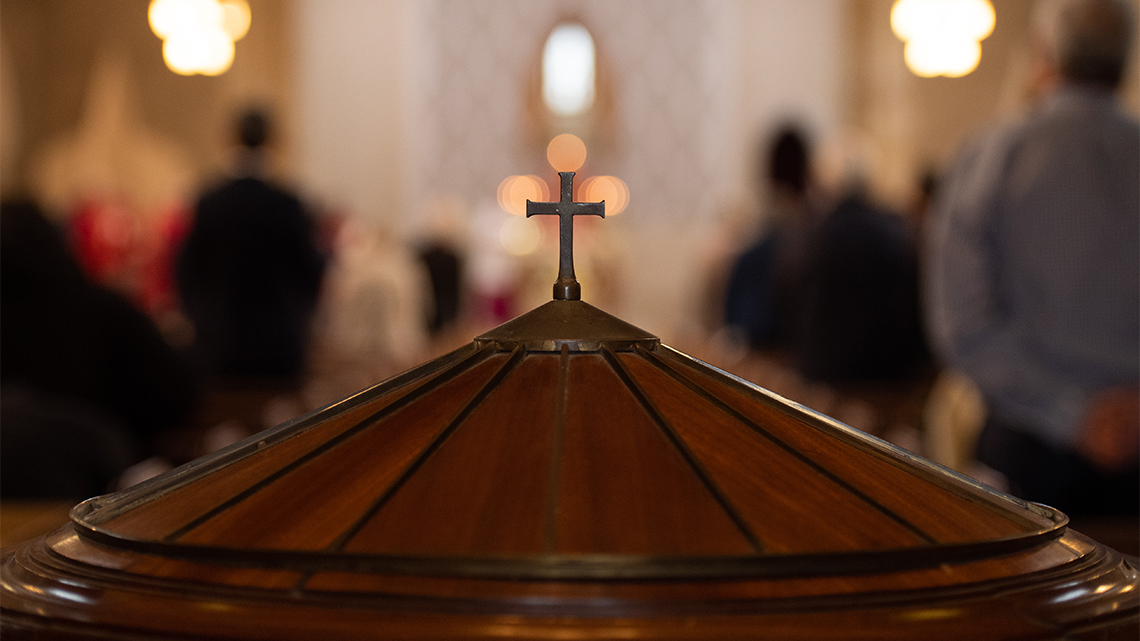
Following the ceremonies of Installation as the new Archbishop of Cardiff and the new Bishop of Menevia ‘in persona Episcopi’ (in the person of the bishop), Archbishop Mark O’Toole, will lead the Catholic community in much of Wales as well as Herefordshire. Here, he reflects on his new calling and sets out his mission as he looks towards the future…
I am grateful and humbled by the trust that the Holy Father, Pope Francis, has placed in me as I begin a new chapter in my ministry as Archbishop of Cardiff and Bishop of Menevia.
Ahead of the Installation ceremonies in Cardiff and Swansea, I feel both a sense of excitement and trepidation. Having only visited Wales and Herefordshire for holidays and retreats, the dioceses are new territory for me. But throughout my life I have learnt to trust the Lord’s will more deeply and I fully embrace this new calling. Jesus encouraged his first Apostles when he said, “Do not be afraid” (John 6:20)”, and “I am with you always, even to the end of the age (Matthew 28:19)”. As a ‘new Apostle’ in this new territory, I have taken great comfort in these words. I believe the Lord goes before me in this new mission; I follow, listen, and learn.
I have already been struck by the rich history of the two dioceses, with their vibrant multicultural cities, rural valleys, and beautiful coastlines. As the son of Irish parents and having spent the last eight years as Bishop in the Diocese of Plymouth, ministering in the counties of Cornwall, Devon and Dorset, I am grateful for the roots we share in our rich Celtic culture.
As I settle into this new role, pastoring two Dioceses, I still have much to learn. But, as the Welsh saying puts it, “Rhaid cropian cyn cerdded” – you must crawl before walking. I am most grateful for the kindness, patience and understanding of not only the Priests, Deacons, Religious and Lay Faithful of both dioceses, but also of the wider community, in providing me with different opportunities to begin the learning and to immerse myself in the region. I am especially conscious of the valuable time needed to listen. I look forward to working with my fellow Christians of all denominations, with people of other faiths and of none, for the good of all in our shared communities.
Since I arrived in Wales, one of the words I have heard most often has been “Croeso” (welcome). It speaks strongly to me of the generous spirit of this land, with its deep spiritual roots. My desire is to broaden this welcome and for both dioceses to be a sanctuary for all, a hope rooted in our shared Christian history, in the lives and example of St David and the many Celtic saints.
Wales is rightly proud of its aspiration to be the world’s first ‘Nation of Sanctuary’, and the two dioceses have already been playing their part in housing Syrian refugees for some years, and now, welcoming Ukrainian families too.
I recall in Evangelii Gaudium (the Joy of the Gospel), Pope Francis describing a parish as a “sanctuary where the thirsty come to drink in the midst of their journey”. It is predominantly within the boundary of the parish that Catholics live out their faith, raise their families, educate their children and minister to the elderly, sick and bereaved. The parish is then a precious place of God’s grace; a place in which every baptised Catholic is called to deepen their own love and friendship of Jesus Christ in the service of their neighbours.
Both at parish and diocesan level, I would like us to extend the warm, Welsh and Herefordshire welcome that I have received, to others; to go out and connect with people, to communicate and share our faith in simple and accessible ways.
People locally, and globally, are facing incredible challenges and hardship. The pandemic, anxiety about the environment, the war in Ukraine and instability in other parts of the world, together with the significant pressures now put on people at a personal and familial level in terms of food, heat and livelihood, are very great concerns for so many. I, together with so many other people of faith, desire to be close to people in all these struggles.
During times of great challenge, the Church has always been a source of hope, comfort, and reassurance. This is still relevant and needed today. We believers must be ready to provide our neighbours with a warm welcome, with practical support, accompaniment and a sure hope founded on the recognition of the great dignity of every human being. We must be ready to provide sanctuary to those in need. I look forward to working with all in our Catholic community, and beyond, to engage with this reaching out – to comfort, to welcome, to pray with and for those in need. In this way, faith may indeed be recognised as the most extraordinary power for good, for all peoples to experience love, to share joy, and to live in hope.